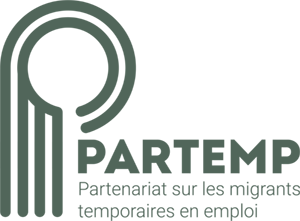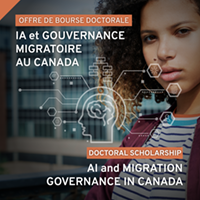The New Face of Migration Management in Canada: Digitalisation, Automation and AI
Recruitment in progress for this project:
This project goes to the heart of transformations in migration management through artificial intelligence (AI), the use of automation tools or big data infrastructures. In Canada, the selection of who can enter and what type of visa or status they are granted is increasingly done by AI and less and less by humans. The growing use of AI in migration management is leading to a spiral of rapid and profound changes that will affect the composition of immigration, the immigration pathways of immigrant applicants, and the work of civil servants and employees specialized in immigration.
This project has five objectives:
- Understand the history of the implementation of digital infrastructures in the processing of immigration files
- Study the implications of algorithmic governance of immigration in the context of multi-governance (federal, provincial)
- Analyze the effects of automation on the employees involved
- Analyze the effects of automation on immigrant applicants
- Analyze the effects of automated decision-making on the composition of immigration.
This project was awarded an Insight Grant from the Social Sciences and Humanities Research Council (SSHRC)
PARTEMP

The PARTEMP (PARtenariat sur les migrants Temporaires en EMPloi) project aims to generate empirical knowledge on temporary migrant workers in the Quebec City region, in order to improve their living and employment conditions. The research is being conducted in four employment sectors: health, agriculture, services (hotels and restaurants) and manufacturing. This vast project is being carried out in collaboration with university researchers and several community and government organizations, with a view to promoting the sharing of knowledge and resources. Indeed, the PARTEMP project aims to address the inequalities in services and support for temporary migrant workers in the Quebec City area.
Transforming Protection: the multiscalar impact of Canada’s welcome to displaced Ukrainians
This research project focuses on the experience of Ukrainians who arrived in Canada after Russia’s invasion of Ukraine on February 24, 2022 (the displaced) and of Ukrainians who were already in Canada and who helped other Ukrainians to come after the war began (the facilitators). It analyzes the migratory trajectories of displaced Ukrainians, their legal status perception, their short-term settlement, and the governance of their reception by province and municipality in Winnipeg, Manitoba, and Quebec City, Quebec. At the macrolevel, this research project seeks to understand the legal and policy impact of the new immigration measures on Canada’s refugee policy. Indeed, displaced Ukrainians constitute a large group of newcomers fleeing a war, yet most have been granted admission as temporary migrants to Canada. This challenges Canada’s traditional focus on durable protection for refugees.
View the narrative map of one family’s journey from Ukraine to Canada
Liberating Migrant Labour?: International Mobility Programs in Settler-Colonial Contexts
This project analyzes international mobility programs and their effects on temporary migrants in comparison with traditional temporary labor migration programs, in the context of colonial states whose political economies are based on the one hand, on the dispossession of indigenous lands, resources and political autonomy, and, on the other, on immigration regimes historically shaped by distinctions between migrants and settlers. International mobility programs attract skilled workers and are often presented as facilitating migrants’ access to permanent settlement. However, research has shown that these programs, if devoid of regulatory protections, can be sources of precariousness and perpetuate differentiated inclusion between migrants and settlers. This major international project, involving teams from Australia, New Zealand, Great Britain and the United States, will take a comparative approach to the issue of labor mobility. Within this framework, the members of the Chair will study the effects of these programs. More specifically, they will collect and analyze data on the extractive industries in Quebec’s northern and aboriginal regions.


